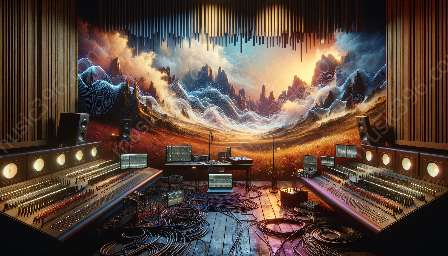Experimental music has long been an area of artistic innovation and creative exploration, often pushing the boundaries of traditional music composition and performance. As a result, the use of pre-existing musical material in experimental music raises important ethical considerations, particularly in the context of intellectual property rights and the intersection of experimental and industrial music.
Understanding the Intersection: Experimental & Industrial Music
Experimental and industrial music are genres known for their avant-garde and boundary-pushing characteristics. Both rely on creating unique sonic experiences that often challenge conventional musical norms. Experimental music explores unorthodox techniques and unconventional sounds, while industrial music incorporates elements of noise, electronic manipulation, and unconventional instrumentation to create a raw and immersive sonic landscape. This intersection creates a unique space for artists to reinterpret and repurpose pre-existing musical material in their experimental compositions.
Intellectual Properties and Rights in Experimental Music
Intellectual property rights in music are designed to protect the original creators and owners of musical compositions, recordings, and performances. When using pre-existing musical material in experimental music, artists must navigate the complexities of copyright law, fair use, and licensing agreements to ensure that they are respecting the intellectual property rights of others while also exercising their creative freedom.
Experimental music often blurs the lines between original and pre-existing musical material, challenging conventional notions of authorship and ownership. This dynamic landscape requires a nuanced approach to ethical considerations, balancing the need for artistic freedom with the respect for intellectual property rights.
Navigating Ethical Considerations
When incorporating pre-existing musical material into experimental compositions, artists should consider the following ethical guidelines:
- Transparency and Attribution: Artists should transparently disclose the sources of pre-existing material and provide proper attribution to the original creators. This helps maintain ethical integrity and acknowledges the contributions of the original artists.
- Fair Use and Transformative Works: Artists should engage with pre-existing material in a transformative manner, adding new artistic value and meaning to the original content. This transformative approach aligns with fair use principles and encourages creative reinterpretation while respecting intellectual property rights.
- Respect for Original Intent: Artists should strive to respect the original intent and context of the pre-existing material while incorporating it into their experimental compositions. This involves considering the cultural and artistic significance of the original work and approaching its use with sensitivity and awareness.
Creating a Balance
It is essential to create a balance between creative exploration and ethical considerations when using pre-existing musical material in experimental music. By embracing transparency, transformative reinterpretation, and respect for original intent, artists can navigate the ethical complexities of blending intellectual properties in their experimental compositions.
Experimental music thrives on innovation and non-conformity, and ethical considerations in the use of pre-existing musical material are integral to sustaining a supportive and respectful creative community that values both artistic expression and intellectual property rights.































